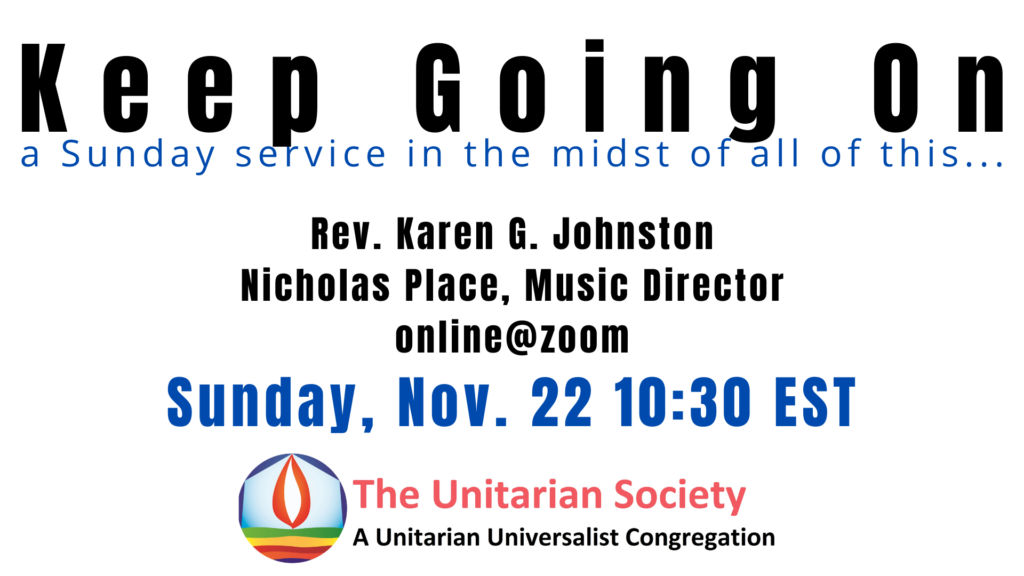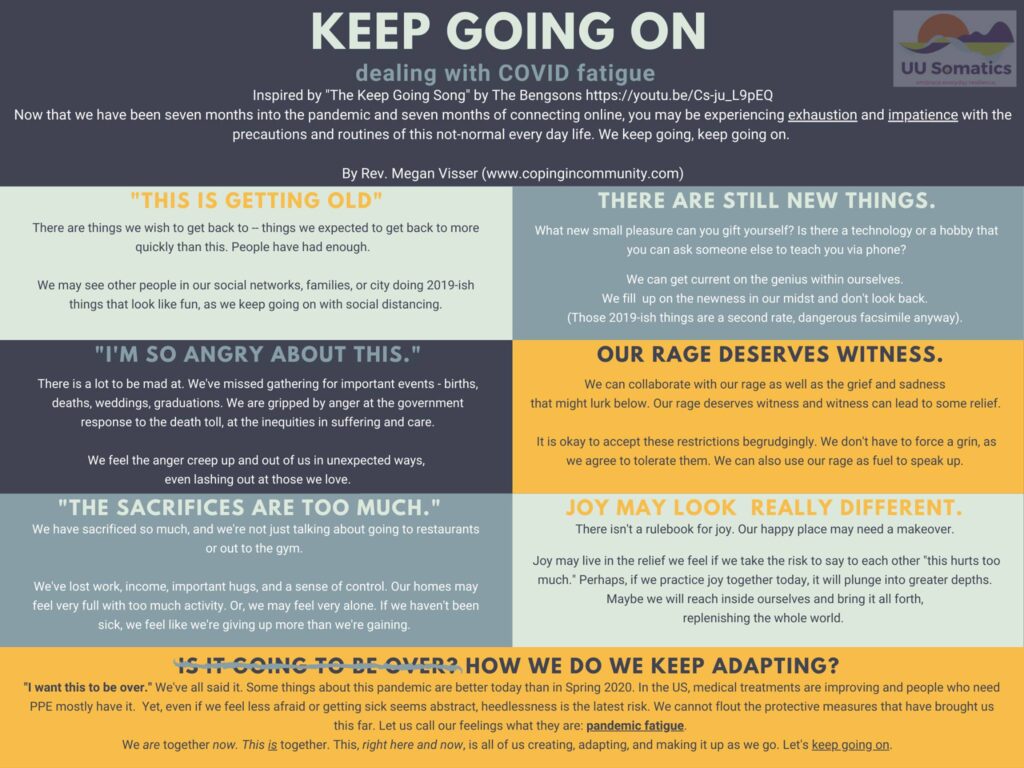
Thanksgiving is not as we imagined or hoped it would be. This will likely be true for Christmas and New Year’s. So much loss, sacrifice, change. And still, we keep going on.
Some of us have lost loved ones – some due to covid, others due to our general mortality; some of us fear losing loved ones because they are sick, or vulnerable, or both. It is almost too much to bear. And still, we keep going on.
There are layers of pandemic pain, of pandemic fatigue – grief, rage, loss, numbness, fragility, edginess. It comes in different shapes and sizes. And still, we keep going on.
Perhaps you remember Rev. Megan Visser, who preached at TUS in July. She spoke on Ross Gay’s Book of Delights? Some of you have shared with me YOUR delight at what she had to share when she led worship that day. Like me, she found delight and wisdom in the Bengsons’ Keep Going song. She used it to explore aspects of pandemic fatigue. I’d like to share her ideas with you. They come in the form of an ailment with an accompanying remedy.
Number one. “This is Getting Old” – I have said this. Felt it. Have you? If so, can I get a Zoom amen? As the song says, they thought they were going to be at Sean’s parents’ house for ten days. “What did we know?” Some of us speculated that this was going to be a marathon, not a sprint. Yet, our intellect can forecast, but the experience of nearly anything, is something altogether different.
We can’t let our response to “this is getting old” be “I’m done with not seeing and hugging my people.” The growing positivity rates tell us: this virus is nowhere near done with us, so we cannot yet be done with it (or with social distancing measures).
According to Rev. Megan, the remedy is finding small pleasures and perceiving genius in our midst, genius that has also been our response to the pandemic. Is there someone who can teach you something new over the phone or outdoors six feet apart? Go ahead: ask them. Find ways to make this getting old into something new and energizing.
Number two. Anger. Rage. Mad, edgy, grouchy. Maybe it’s at the governmental response, or the virus, or a particular person. There’s much to be mad about – the loss of weddings, graduations, deaths, births, holiday celebrations. Our anger can surprise us, when we unexpectedly lash out, it can hurt others.
Rather than willing away our anger, our turning ourselves away from it, the remedy is that we bear witness to it. Find ways to express it, to vent it, to befriend it, and to let it move through us, leaving the possibility of relief. Maybe it’s through scribble journaling, screaming into a pillow, casting a spell or taking part in a ritual. I’m a big fan of someone listening without trying to fix.
And smashing crockery.
Number three. Haven’t we all sacrificed too much already? I’m not talking about dining at restaurants or going to the gym. Lost jobs. Lost security. Not being able to hug those we love. Not being able to sing together. Losing our sense of purpose.
We hear Abigail sing the remedy in the song: “What about joy? O boy!” She wonders and wishes that her joy could pollinate your joy, working it out as she goes along. “There is no rulebook for joy,” says Rev. Megan. Yet me must find a way, returning over and over as much as we can, to bring it forth – for ourselves, for each other, for the world.

So three ailments and three remedies:
What feels old requires of us to find something new.
What surfaces anger requires of us to give space and to witness that anger.
And when we feel the burden of all our sacrifices, we must find our way to joy.
While we might want to ask, “When is it going to be over?” we must train ourselves, gently, lovingly, perhaps with our hand on our heart and “oh, honey” in our tone of voice, to ask a different question: “How do we keep adapting?”
That is the rightful question to ask when we want to figure out how to keep going on.